David Garyan from the US is a student of the I-CONTACT programme in the Ravenna Campus.
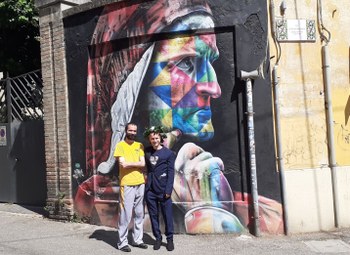
Why Unibo? The oldest university in the world with the most appealing programmes
My name is David Garyan and I’m a graduate of the International Cooperation on Human Rights and Intercultural Heritage (I-CONTACT) program at the University of Bologna.
My university path began in the US, where I received a bachelor’s degree in English from Cal State Northridge (CSUN), then I pursued a master’s degree at Cal State Long Beach (CSULB), once again in English, and after this I immediately entered the MFA program in poetry at CSULB, graduating in 2017. After working as an adjunct professor at San Bernardino Valley College (SBVC), I decided that I wanted to study in Europe, and I chose UNIBO for two reasons: firstly, I found the programme which appealed to me, and, secondly, I was attracted to the idea of coming to Italy for the purpose of studying at the oldest university in the world. When I was accepted, I didn’t spend too much time thinking about whether I should go or not, and after more than two years here, with my diploma in hand, I’m happy to have made this decision.
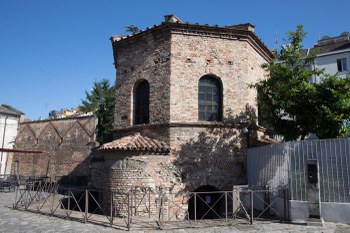
Ravenna, the city that inspired me
I chose Italy because it’s a country I’ve always been fascinated by — starting with its early history of the Roman Empire, down to the Renaissance, and up to the present day.
I chose the University of Bologna not only for practical but also idyllic reasons; in terms of the first, it offered the programme I was looking for, in a city I found fascinating — Ravenna. Since I have a literary background, living in a city that was once home to Lord Byron, and was the subject of poems written by Oscar Wilde, Herman Hesse, and T.S. Eliot, among others, seemed only natural to me. Dante, to say the least, meant a great deal as well. In fact, during the first year of my studies, I wrote a book length poem (in three parts) about Ravenna and published it in an international literary magazine called Interlitq.
Worldwide bureaucracy: an exercise in patience
Preparing to enrol at the University of Bologna was pretty straightforward, everything was explained to me in a clear way, but the process was still quite a lengthy one: notarizing my diplomas and getting an Apostille; the pre-enrolment procedure with the Consulate; then submitting the application for the visa. Once the enrolment process in the US was accomplished, the work wasn’t over. Arriving in Italy, I had to register with the Questura (Italian Police Station) within 7 days and then begin the process of applying for the residency permit, along with getting the codice fiscale (Italian tax code). All of this takes time and sometimes it can be difficult, but the procedure, at least for me, was really an exercise in patience, rather than difficulty. I followed all the instructions and didn’t waste too much time.
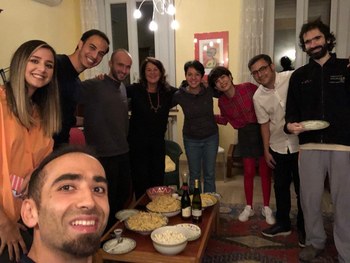
A comprehensive programme and a lively social life
I enjoyed pretty much all the teaching activities, and before the pandemic, coming to class in a new environment was truly a pleasure. I especially loved the fact that my programme allowed me to take classes covering a variety of topics: economics, history, archaeology, and political science
Studying at UNIBO was certainly not an easy undertaking and I didn’t expect it to be. This doesn’t mean there was no enjoyment whatsoever in the process; on the contrary, there were plenty of resources that students could take advantage of, and I utilized many of them—cultural programmes, language exchanges, discounts on concerts, and especially the welcome events, which, in the beginning, were very helpful in making my transition easier. When I didn’t participate in university-organized events, I mostly just hung out with my friends, seeing the centre, attending parties, and all the usual things that college students do. As an international student, I met many people whose culture was different from mine, and this was another important aspect in my so-called “education.”
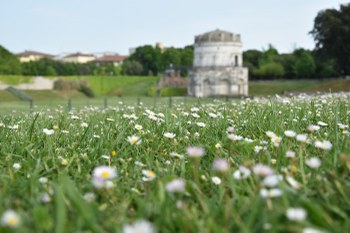
"Ravenna, I came here
to forget how English is thought
and to find your sentences
that don’t need a subject.”
Let’s begin with the country and move towards Ravenna. Italy is a place full of cultural and geographic diversity. I chose Italy as my destination because it has, throughout its long history, enriched not only the culture of Europe, but has also made lasting impacts in places like the US, where I’m from. Antonio Meucci, Amadeo Peter Giannini, William Pacca, and Caesar Rodney are names that perhaps many won’t recognize, but these are just some of the Italian-Americans who’ve made lasting contributions to the country: Meucci is credited by Congress as the inventor of the telephone; Giannini founded Bank of America—the largest bank in the country; William Pacca and Caesar Rodney were both Founding Fathers and signed the Declaration of Independence. Our countries may be oceans apart, but they share a cultural and social bond that goes back to the very foundation of the US.
Ravenna represents, in this respect, some of the best of what Italy has to offer. It’s a town with seven UNESCO sites—something seemingly impossible for a city of less than 200,000 inhabitants. When you consider that entire countries like Finland only have a total of seven sites, it really puts things into perspective. Studying here, hence, as someone with an interest in literature and history, was always an enjoyable experience because the feeling of being surrounded by ancient artifacts and culture was overwhelming; there was always something to do, discover, and see. Ravenna is very compact, livable, and easy to navigate. I spent two years in the city without needing a car, or even a bike, and I was able to go everywhere on foot. I basically never rode the bus.
The problem with studying in small towns like Ravenna is accommodation. Finding accommodation can be quite difficult and it’s important to arrive here as early as possible to maximize the chances of finding something.
The pandemic made studying and living in Italy quite complicated, but neither Italy, much less UNIBO, can be blamed for what happened. What I may say with confidence is that the university, along with everyone here, tried their best to make my journey as comfortable as possible; indeed, this was one of the reasons why, after arriving in September 2019, I decided not to travel back to the US. I wanted to make this an authentic Italian experience and, at least for me, it would’ve been quite strange to sit in the US, in a totally different environment from the one where my classes were taking place, and listen to professors and students who were thousands of miles away from me—I just couldn’t do it, and so I never went back.
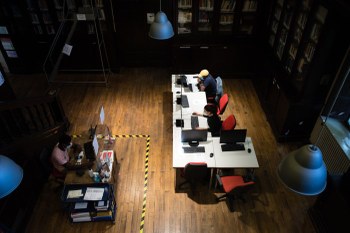
Studying in Italy improved my organizational skills
Studying at UNIBO was definitely different than studying in the US; the whole exam system was mostly oral, and I wasn’t used to that, but I found that gradually things became easier and I began to manage. Also, unlike in the US, attendance wasn’t mandatory and I had to become more self-sufficient in planning my own schedule, knowing when to take exams, and taking care of other organizational matters that were typically delegated to the university back in the US. I would say I grew as a person and became more of an “independent” student in the Italian system.
Befriend the locals, they can be a safety net
Talking to people, every chance you get, isn’t just an opportunity to improve your language skills, but it’s also a way of building a social circle, which can come in quite handy when you need help or advice. A solid social circle/support system has become even more important during the pandemic, and the way to make one isn’t really that difficult. I attended almost every welcome event, and any opportunity I had to talk with someone, I took advantage of that. The university offers plenty of resources, and it even has a free psychological support service if you’re feeling really in need of help. Fortunately, I never had to resort to this service, but it’s comforting to know that things like this exist, just in case of emergencies.
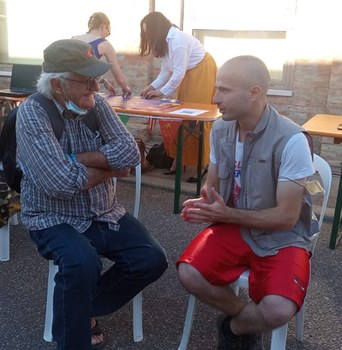
Studying at Unibo and living in Italy made me grow as a person
Given all the challenges, but also joys, I’m happy to have chosen Italy, and specifically UNIBO. Having the distinction of studying at the oldest university in the world softened all the difficulties and made the joyous days even brighter. Had the pandemic not happened, life in Italy (and everywhere in the world) would naturally have been easier, but it nevertheless wouldn’t have been without problems. As I mentioned in the beginning, studying, especially at the postgraduate level, is an enterprise that already brings with it inherent difficulties — and yet they’re precisely the ones which helped me grow. As a result of having to adjust to a new educational system — more oral exams, less essay writing — I became a much more confident speaker, being able to present ideas in a clearer, coherent manner; in this respect, adjusting to a different examination style was difficult, but it was precisely challenges like this that helped me become a more complete person.
Living in Italy, too, while romantic and full of interesting things, isn’t a vacation; however, there’s really no better education than travel — prolonged exposure to things and environments which are foreign to you. All these things presented challenges in the beginning, and they still do in many ways, but the act of adjusting to these differences has made me a more resilient person, capable of dealing with changes and uncertainties in healthier ways than I perhaps did before.
If given the chance to do this again — knowing what I know now — I would definitely go for it!